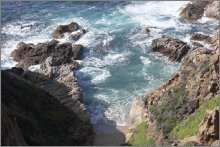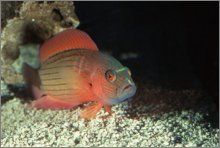Finding Cures Under the Sea: The Search for New Medicines in Our Oceans
by www.SixWise.com
More than 70 percent of the earth's surface is covered in
water, and beneath the silvery waves and blue-green tides
is a complex world teeming with undiscovered plant and animal
life. Deep-water habitats of the world's oceans represent
a vastly untapped resource -- only a few hundred thousand
marine organisms have been scientifically documented, which
is hardly even the tip of the iceberg.
|

The vast majority of the oceans' potential cures have
yet to be discovered.
|
Meanwhile -- while many who read the SixWise.com newsletter
would agree that prescription drugs are extensively over-prescribed
and over-used -- it is also true that some drugs are quite
necessary and can help to save lives or ease suffering.
Researchers are well aware that many of the most powerful
compounds from which some of the best drugs are made stem
from nature's secrets … the jungles, the rainforests
and also the oceans. In fact, about
75 percent of the top 20 hospital drugs and 20 percent of
the top 100 most-prescribed drugs come from natural sources.
"Life originated in the oceans and has evolved over
a much longer time than on land, so the diversity of life
is far greater," said Professor Carlo Heip from the Netherlands
Institute of Ecology.
And during their long evolution, marine life has adapted
to, and is able to survive, some of the harshest environments
-- extreme cold, pitch-black waters, and pressure levels that
could easily crush a human. It is their unique ability to
survive and even thrive against all odds that have researchers
very interested in what lies beneath.
"I believe marine organisms can be used to eliminate
disease and human suffering," said William Speck, pediatrician
and director of the Marine Biological Laboratory. "We
now have the technology to visit the deep ocean floor, and,
because of DNA technology, to more deeply understand life
and ourselves."
Medicines From the Deep
Many drugs that are used today -- like statin drugs used
to lower cholesterol and aspirin -- have originated from natural
sources. Now researchers are hoping to find compounds that
could one day soon be used to treat everything from infectious
diseases to cancer under the sea. Some of the most intriguing
discoveries to date include:
Iscodermolide: A potent anti-tumor agent isolated
from a deep-water sponge.
Topsentin: An anti-inflammatory substance from a
deep-water sponge that could help treat arthritis, inflammatory
bowel disease and skin irritations, and protect against
colon cancer and Alzheimer's disease.
Horboxazole: A substance made by an Indian Ocean
sponge that can inhibit the growth of a wide range of tumor
cell types. "It uses a different mechanism to any known
drug, it's unlike anything else," said Tadeusz Molinski,
a professor of chemistry at the University of California,
Davis.
|

Marine life can survive extreme conditions like cold,
darkness and intense pressure, and many contain unique
toxins to ward off enemies. Many of these compounds
could have potential uses in treating human disease.
|
Discodermolide: A compound produced by a deep-water
sponge from the Bahamas that is being tested as a potential
cancer treatment.
Prialt: A drug approved in the United States that's
made from the venom of the Pacific cone snail. More powerful
than morphine, but without the addicting effects, the Pacific
cone snail's venom was used to make this potent painkiller.
NOTE: (taken from the drug's Web site) Severe psychiatric
symptoms and neurological impairment may occur during treatment
with PRIALT. Patients with a pre-existing history of psychosis
should not be treated with PRIALT.
Other drugs made from ocean creatures have been around for
some time, such as:
-
Compounds from sea cucumbers used in cancer treatments
-
Compounds from the stonefish used to lower blood pressure
-
Compounds from ocean snails used as a muscle relaxant
-
Certain sea anemones that are used to make a heart stimulant
Are the Ocean's Treasures Disappearing?
The biodiversity of the ocean may not be around forever.
Overfishing has depleted large numbers of fish, such as sharks,
which affects the entire food chain. Climate changes, pollution
and the introduction of alien species (such as those carried
from port to port by ships) are also affecting the ocean's
biodiversity.
If the earth's oceans are to continue offering new discoveries
and cures, its fragile ecosystem will have to be maintained.
"It's important to look not just at biodiversity but
at how ecosystems function," said Dr. Adrianna Ianora,
an ecologist at Stazione Zoologica, Anton Dohrn, Italy. "We
need to know how biodiversity is maintained as the ocean is
a very important resource for humanity."
In the meantime, researchers will continue exploring the
depths and trying to decipher the mysteries it reveals.
"It's like a crossword puzzle where you have to find
the clues," Molinski said. "Natural products engage
your intellectual curiosity with a sense of wonder that comes
from standing at the shores of new worlds."
Recommended Reading
Drugs
with Potentially Psychotic Side Effects: Which Ones are They
(& Who Deserves to Know)?
Adverse
Drug Reactions on the Rise: What You Can Do to Shield Yourself
from the Dangers of ADRs
Sources
NOAA
Ocean Explorer
Medical
News Today: Drugs From the Depths of the Ocean
Science
Daily: Elusive Cancer Killer's Deep-sea Hideout Discovered
After A Nearly 20-year Hunt
Lawrence
Journal World
BBC
News: Ocean Medicines Could be Lost
National
Geographic News: Scientists Seek New Medicines From the Oceans